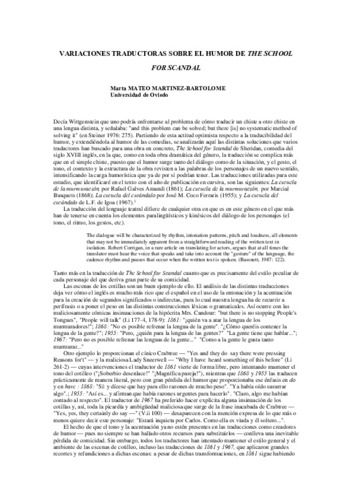Variaciones traductoras sobre el humor de 'The school for scandal'
Autor(es) y otros:
Fecha de publicación:
Editorial:
Universidad de Zaragoza
Citación:
Descripción física:
Resumen:
Focussing on comedic humour, the paper analyses the different strategies that four translators have used to render Sheridan's The School for Scandal into Spanish. Comedic humour does not simply spring from characters' words but also from the situation, the gesture, the tone, the context and the plot, all of which add to the humourous load that the dialogue may have of its own. The translation of humour in comedies also differs from that of other literary genres in the fact that it has to pay attention both to the written text and to a potential performance; furthermore, linguistic signs may be translated into kinesic signs with a similar effect. This special malleability is shown in the paper through the study of the different translations of the elements used by Sheridan to create the humour in his play: the characters' idiolect, intonation, rhythm, tone, alliteration, repetition, reversal of syntactic and situational expectations, proper names, wordplay and contextual references.
Focussing on comedic humour, the paper analyses the different strategies that four translators have used to render Sheridan's The School for Scandal into Spanish. Comedic humour does not simply spring from characters' words but also from the situation, the gesture, the tone, the context and the plot, all of which add to the humourous load that the dialogue may have of its own. The translation of humour in comedies also differs from that of other literary genres in the fact that it has to pay attention both to the written text and to a potential performance; furthermore, linguistic signs may be translated into kinesic signs with a similar effect. This special malleability is shown in the paper through the study of the different translations of the elements used by Sheridan to create the humour in his play: the characters' idiolect, intonation, rhythm, tone, alliteration, repetition, reversal of syntactic and situational expectations, proper names, wordplay and contextual references.
ISSN:
Colecciones
- Artículos [36390]
- Filología Inglesa, Francesa y Alemana [553]
Ficheros en el ítem




